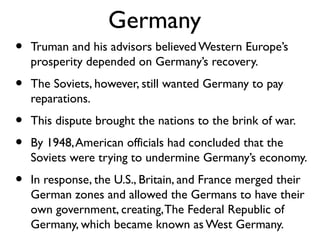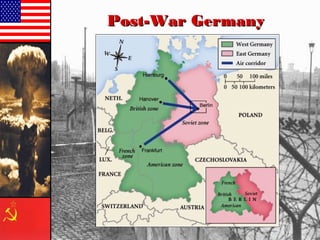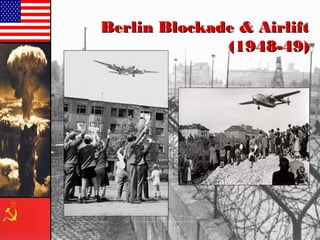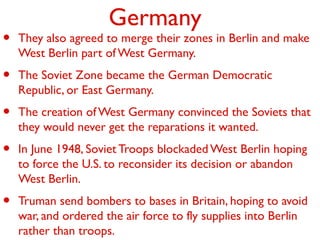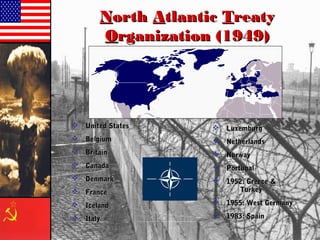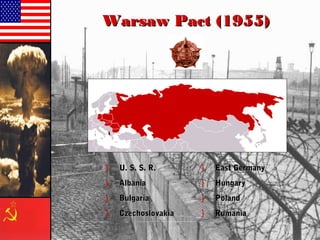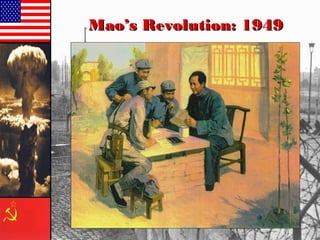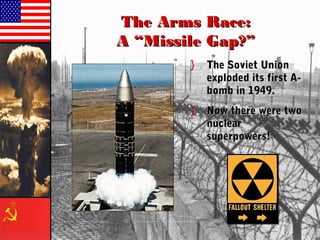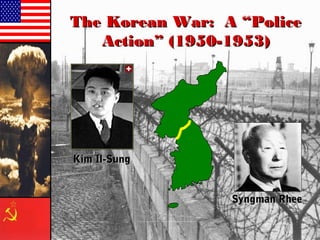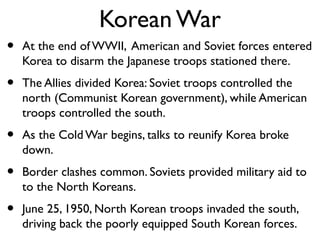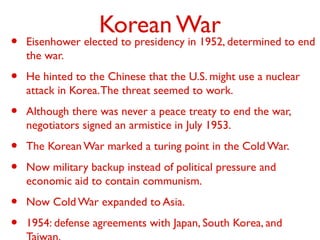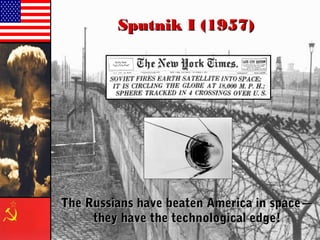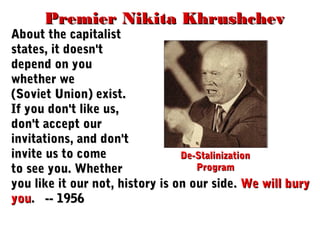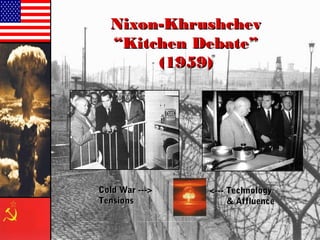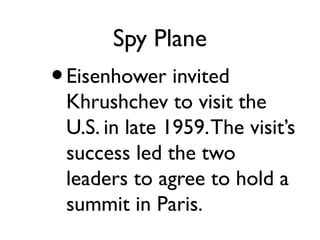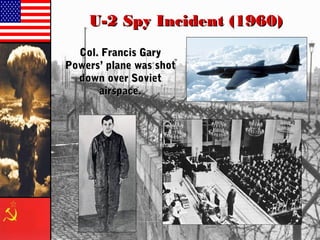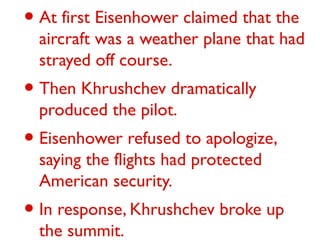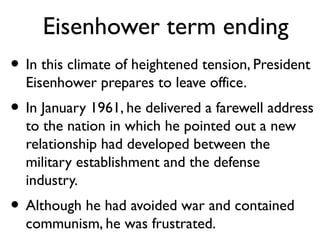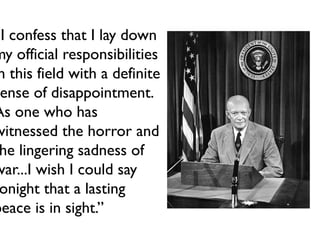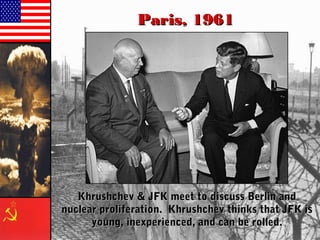Cold war
- 1. The Early Cold War: 1947-1970 Ms. Susan M. PojerMs. Susan M. Pojer Horace Greeley HS Chappaqua, NYHorace Greeley HS Chappaqua, NY
- 3. The Ideological StruggleThe Ideological Struggle Soviet & Eastern Bloc Nations [“Iron Curtain”] US & the Western Democracies GOAL spread world-wide Communism GOAL “Containment” of Communism & the eventual collapse of the Communist world. [George Kennan]METHODOLOGIES: Espionage [KGB vs. CIA] Arms Race [nuclear escalation] Ideological Competition for the minds and hearts of Third World peoples [Communist govt. & command economy vs. democratic govt. & capitalist economy] “proxy wars” Bi-Polarization of Europe [NATO vs. Warsaw Pact]
- 4. The “Iron Curtain”The “Iron Curtain” From Stettin in the Balkans, to Trieste in the Adriatic,From Stettin in the Balkans, to Trieste in the Adriatic, anan iron curtainiron curtain has descended across the Continent.has descended across the Continent. Behind that line lies the ancient capitals of Central andBehind that line lies the ancient capitals of Central and Eastern Europe.Eastern Europe. -- Sir Winston Churchill, 1946-- Sir Winston Churchill, 1946
- 5. Iron Curtain •The political and military barrier that isolated Soviet- controlled countries of Eastern Europe after World War II.
- 6. Truman Doctrine [1947]Truman Doctrine [1947] 1.1. Civil War in Greece.Civil War in Greece. 2.2. Turkey under pressure from the USSR forTurkey under pressure from the USSR for concessions in the Dardanelles.concessions in the Dardanelles. 3.3. The U. S. should support free peoplesThe U. S. should support free peoples throughout the world who were resistingthroughout the world who were resisting takeovers by armed minorities or outsidetakeovers by armed minorities or outside pressures…We must assist free peoples topressures…We must assist free peoples to work out their own destinies in their ownwork out their own destinies in their own way.way. 4.4. The U.S. gave Greece & Turkey $400 millionThe U.S. gave Greece & Turkey $400 million in aid.in aid.
- 7. Marshall Plan [1948]Marshall Plan [1948] 1.1. ““European RecoveryEuropean Recovery Program.”Program.” 2.2. Secretary of State,Secretary of State, George MarshallGeorge Marshall 3.3. The U. S. should provideThe U. S. should provide aid toaid to allall European nationsEuropean nations that need it. This movethat need it. This move is not against any country or doctrine, butis not against any country or doctrine, but against hunger, poverty, desperation, and chaos.against hunger, poverty, desperation, and chaos. 4.4. $12.5 billion of US aid to Western Europe$12.5 billion of US aid to Western Europe extended to Eastern Europe & USSR, [but thisextended to Eastern Europe & USSR, [but this was rejected].was rejected].
- 8. Germany • Truman and his advisors believed Western Europe’s prosperity depended on Germany’s recovery. • The Soviets, however, still wanted Germany to pay reparations. • This dispute brought the nations to the brink of war. • By 1948,American officials had concluded that the Soviets were trying to undermine Germany’s economy. • In response, the U.S., Britain, and France merged their German zones and allowed the Germans to have their own government, creating,The Federal Republic of Germany, which became known as West Germany.
- 10. Berlin Blockade & AirliftBerlin Blockade & Airlift (1948-49)(1948-49)
- 11. Germany • They also agreed to merge their zones in Berlin and make West Berlin part of West Germany. • The Soviet Zone became the German Democratic Republic, or East Germany. • The creation of West Germany convinced the Soviets that they would never get the reparations it wanted. • In June 1948, Soviet Troops blockaded West Berlin hoping to force the U.S. to reconsider its decision or abandon West Berlin. • Truman send bombers to bases in Britain, hoping to avoid war, and ordered the air force to fly supplies into Berlin rather than troops.
- 12. NNorthorth AAtlantictlantic TTreatyreaty OOrganization (1949)rganization (1949) United StatesUnited States BelgiumBelgium BritainBritain CanadaCanada DenmarkDenmark FranceFrance IcelandIceland ItalyItaly LuxemburgLuxemburg NetherlandsNetherlands NorwayNorway PortugalPortugal 1952: Greece &1952: Greece & TurkeyTurkey 1955: West Germany1955: West Germany 1983: Spain1983: Spain
- 13. Warsaw Pact (1955)Warsaw Pact (1955) } U. S. S. R.U. S. S. R. } AlbaniaAlbania } BulgariaBulgaria } CzechoslovakiaCzechoslovakia } East GermanyEast Germany } HungaryHungary } PolandPoland } RumaniaRumania
- 14. Mao’s Revolution: 1949Mao’s Revolution: 1949
- 15. The Arms Race:The Arms Race: A “Missile Gap?”A “Missile Gap?” } The Soviet UnionThe Soviet Union exploded its first A-exploded its first A- bomb in 1949.bomb in 1949. } Now there were twoNow there were two nuclearnuclear superpowers!superpowers!
- 16. The Korean War: A “PoliceThe Korean War: A “Police Action” (1950-1953)Action” (1950-1953) Syngman RheeSyngman Rhee Kim Il-SungKim Il-Sung
- 17. Korean War • At the end of WWII, American and Soviet forces entered Korea to disarm the Japanese troops stationed there. • The Allies divided Korea: Soviet troops controlled the north (Communist Korean government), while American troops controlled the south. • As the Cold War begins, talks to reunify Korea broke down. • Border clashes common. Soviets provided military aid to to the North Koreans. • June 25, 1950, North Korean troops invaded the south, driving back the poorly equipped South Korean forces.
- 18. Korean War • Eisenhower elected to presidency in 1952, determined to end the war. • He hinted to the Chinese that the U.S. might use a nuclear attack in Korea.The threat seemed to work. • Although there was never a peace treaty to end the war, negotiators signed an armistice in July 1953. • The Korean War marked a turing point in the Cold War. • Now military backup instead of political pressure and economic aid to contain communism. • Now Cold War expanded to Asia. • 1954: defense agreements with Japan, South Korea, and
- 19. Sputnik I (1957)Sputnik I (1957) The Russians have beaten America in space—The Russians have beaten America in space— they have the technological edge!they have the technological edge!
- 20. Premier Nikita KhrushchevPremier Nikita Khrushchev About the capitalistAbout the capitalist states, it doesn'tstates, it doesn't depend on youdepend on you whether wewhether we (Soviet Union) exist.(Soviet Union) exist. If you don't like us,If you don't like us, don't accept ourdon't accept our invitations, and don'tinvitations, and don't invite us to comeinvite us to come to see you. Whetherto see you. Whether you like it our not, history is on our side.you like it our not, history is on our side. We will buryWe will bury youyou. -- 1956. -- 1956 De-StalinizationDe-Stalinization ProgramProgram
- 21. Nixon-KhrushchevNixon-Khrushchev “Kitchen Debate”“Kitchen Debate” (1959)(1959) Cold War --->Cold War ---> TensionsTensions <--- Technology<--- Technology & Affluence& Affluence
- 22. Spy Plane •Eisenhower invited Khrushchev to visit the U.S. in late 1959.The visit’s success led the two leaders to agree to hold a summit in Paris.
- 23. U-2 Spy Incident (1960)U-2 Spy Incident (1960) Col. Francis GaryCol. Francis Gary Powers’ plane was shotPowers’ plane was shot down over Sovietdown over Soviet airspace.airspace.
- 24. • At first Eisenhower claimed that the aircraft was a weather plane that had strayed off course. • Then Khrushchev dramatically produced the pilot. • Eisenhower refused to apologize, saying the flights had protected American security. • In response, Khrushchev broke up the summit.
- 25. Eisenhower term ending • In this climate of heightened tension, President Eisenhower prepares to leave office. • In January 1961, he delivered a farewell address to the nation in which he pointed out a new relationship had developed between the military establishment and the defense industry. • Although he had avoided war and contained communism, he was frustrated.
- 26. “I confess that I lay down my official responsibilities n this field with a definite ense of disappointment. As one who has witnessed the horror and he lingering sadness of war...I wish I could say onight that a lasting peace is in sight.”
- 27. Paris, 1961Paris, 1961 Khrushchev & JFK meet to discuss Berlin andKhrushchev & JFK meet to discuss Berlin and nuclear proliferation. Khrushchev thinks that JFK isnuclear proliferation. Khrushchev thinks that JFK is young, inexperienced, and can be rolled.young, inexperienced, and can be rolled.
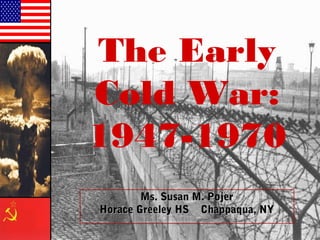
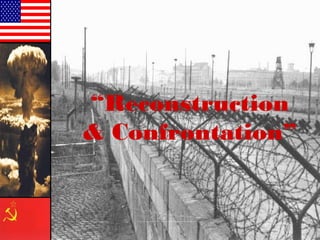
![The Ideological StruggleThe Ideological Struggle
Soviet & Eastern
Bloc Nations
[“Iron Curtain”]
US & the
Western
Democracies
GOAL spread world-wide
Communism
GOAL “Containment” of
Communism & the eventual
collapse of the Communist
world.
[George Kennan]METHODOLOGIES:
Espionage [KGB vs. CIA]
Arms Race [nuclear escalation]
Ideological Competition for the minds and hearts of
Third World peoples [Communist govt. & command
economy vs. democratic govt. & capitalist economy]
“proxy wars”
Bi-Polarization of Europe [NATO vs. Warsaw Pact]](https://image.slidesharecdn.com/coldwar-140511202448-phpapp02/85/Cold-war-3-320.jpg)
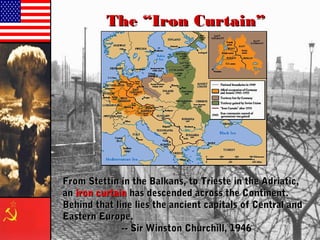
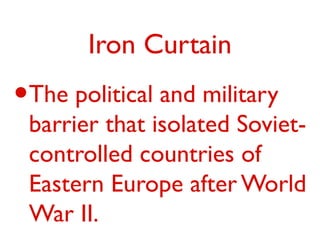
![Truman Doctrine [1947]Truman Doctrine [1947]
1.1. Civil War in Greece.Civil War in Greece.
2.2. Turkey under pressure from the USSR forTurkey under pressure from the USSR for
concessions in the Dardanelles.concessions in the Dardanelles.
3.3. The U. S. should support free peoplesThe U. S. should support free peoples
throughout the world who were resistingthroughout the world who were resisting
takeovers by armed minorities or outsidetakeovers by armed minorities or outside
pressures…We must assist free peoples topressures…We must assist free peoples to
work out their own destinies in their ownwork out their own destinies in their own
way.way.
4.4. The U.S. gave Greece & Turkey $400 millionThe U.S. gave Greece & Turkey $400 million
in aid.in aid.](https://image.slidesharecdn.com/coldwar-140511202448-phpapp02/85/Cold-war-6-320.jpg)
![Marshall Plan [1948]Marshall Plan [1948]
1.1. ““European RecoveryEuropean Recovery
Program.”Program.”
2.2. Secretary of State,Secretary of State,
George MarshallGeorge Marshall
3.3. The U. S. should provideThe U. S. should provide
aid toaid to allall European nationsEuropean nations
that need it. This movethat need it. This move
is not against any country or doctrine, butis not against any country or doctrine, but
against hunger, poverty, desperation, and chaos.against hunger, poverty, desperation, and chaos.
4.4. $12.5 billion of US aid to Western Europe$12.5 billion of US aid to Western Europe
extended to Eastern Europe & USSR, [but thisextended to Eastern Europe & USSR, [but this
was rejected].was rejected].](https://image.slidesharecdn.com/coldwar-140511202448-phpapp02/85/Cold-war-7-320.jpg)
